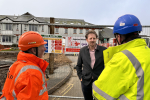Derek Thomas has co-hosted another Climate Focus event, with Cllr Jonathan How and Pippa Stilwell, for the many constituents who are concerned about the effects of Climate Change and protecting the environment. This week’s session asked some difficult questions about the part mining – both for minerals or geothermal energy – can play in Cornwall’s future.
The first speaker was Hazel Farndale from Geothermal Engineering, who are building the UK’s first geothermal power plant at United Downs. She explained how the plan was using groundsource heat pumps 5 kilometres deep to generate power, with low carbon emissions (less that 5g per kWh, compared to the national grid’s average of 181g per kWh) and the smallest surface footprint of any renewable energy source. Geothermal is one of the few renewable energy sources which can operate at any time – unlike wind and solar energy, which are intermittent.
The earth gets hotter as it gets nearer to the earth’s core, and geothermal power plants extract this heat and uses it to drive turbines and generate energy. Hazel explained how Cornwall was particularly suitable, as the granite beneath our feet has a higher geothermal gradient than other rocks – which means it gets hotter faster, meaning the pumps do not have to be as deep as in other parts of the country.
Hazel added how geothermal energy could have other advantages for the environment: lithium, a vital ingredient in batteries, can be extracted from the geothermal waters, making traditional hard rock mining unnecessary. Greenhouses could be heated by geothermal power, as in Holland, reducing reliance on imports.
The next speaker, Neill Wood, an academic at Camborne School of Mines and director of geophysics company GeoDefinition, gave a more provocative talk, arguing that large scale sustainability requires technology, and large scale technology needs power and electronics – which require a vast range of metals.
He argued that the best mining technology was in the West, but we were still relying on energy-intensive mining in the developing world. “We’ve heard about food miles – we should be thinking about metal miles.”
He outlined some of the new mining practices which could be used, those already practicable – such as backfilling mines with the spoil, to protect both the environment above ground and the stability of the earth – and those for the future, such as (to great interest in the group) extracting metals from asteroids and other sources in space.
There was a very lively discussion about the development of this industry, with participants raising issues about water contamination, planning issues, and the strategic importance of our own minerals.
Derek says:
“This is a fascinating subject, and one that could be very important for Cornwall, and tonight’s Climate Focus event gave us the opportunity to get to grips with it.
“We have to take the challenges of decarbonisation seriously – we can’t pretend that we can satisfy our energy needs with intermittent energy sources like wind and solar, and we can’t outsource our mineral needs to the developing world.
“I’m not going to pretend there are easy answers. But I am delighted that there are people in West Cornwall prepared to ask the hard questions.
“The two speakers were brilliant, and the discussion afterwards very constructive, and I’d urge anyone who missed it to catch up on youtube.”



